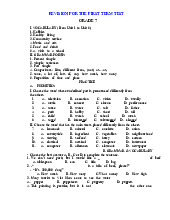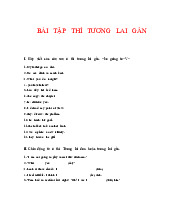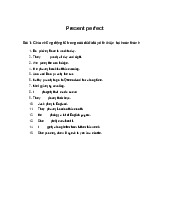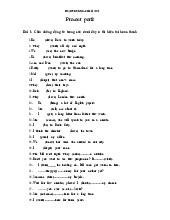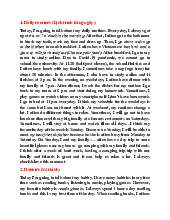







Preview text:
lOMoARcPSD| 36149638 MoARc PSD| 36149638 1.
Causal clauses (Cause – effect relationships) lOMoARcPSD| 36149638
II. Combine the sentences in each pair into a new sentence that shows a
cause – effect relationship. Use the words in brackets.
1. Many rivers and lakes are poisoned. Factories produce waste and pour it into rivers and lakes. (because)
……………………………………………………………………………………………
2. The environment is polluted. Birds leave their habitats and plants die. (makes)
……………………………………………………………………………………………
3. Plastic bags are a major source of waste. We should not throw plastic bags everywhere. (so)
……………………………………………………………………………………………
4. The food is contaminated. People’s health is poor. (results in)
……………………………………………………………………………………………
5. Factories release fumes. The air people breathe gets polluted. (due to)
……………………………………………………………………………………………
6. Noise pollution happens. There is a change in animals’living pattern.( causes)
……………………………………………………………………………………………
7. Radioactive pollution is very dangeruos. It can cause abnormal growth. ( since)
………………………….…………………………………………………………………
8. Fossil fuels such as coal or oil are burned. Acid gases are produced. (so)
……………………………………………………………………………………………
9. Leaves are damaged. The tree cannot get enough food energy to stay healthy.(because)
……………………………………………………………………………………………
10.The area is uninhabitable. The Chernobyl nuclear accident happened.( made)
……………………………………………………………………………………………
III.Put the verbs in brackets into the correct form to complete the sentences.
1) If the local people drink the contaminated water, they (have) health problems.
2) If there were more trees in this area, the air (be)...........................fresher.
3) All the aquatic animals (die) …………….. if people don’t stop dumping sewage into the lake. lOMoARcPSD| 36149638
4) Global warming (not happen)
if there weren’t too much carbon dioxide in the atmosphere.
5) If the sun (shine)......................................., we will walk to the mountain.
6) If people (stop) …………….. digging the street, there wouldn’t be noise pollution in this area.
7) People use a lot of cars and motorcycles. If people (reduce) …………….. the use of
motor vehicles, there (be)..........................less serious air pollution.
8,If you (not read) …………….. these articles, you (not know) …………….. the facts about water pollution.
9, If I (be) …………….. the president, I (remove)…………………all the factories out of the city.
10, Your brother (have)…………….. hearing problems if he (listen)………….too to loud music.
11. If Tracy had a mobile phone, she (phone) ............................ all her friends.
12. I will be very angry with Nick if he (forget) ............................ my CD again.
13. If the boys win this match, their coach (invite) ............................ them to a barbecue.
14. If you (not/ read) ............................ these articles, you will not know the facts about Africa.
15. You (get) ............................ very wet if you walked in this rain.
16. The engine (not/ start) ............................ if Ben connected these two cables.
17. If he (have) ............................ time, he will buy her some sweets.
18. Maria would play in the school orchestra if she (practice) ............................ the trumpet more often.
19. We (not/ fetch) ............................ something to drink if Jim does not bring some sandwiches.
20. If he (carry) ............................ the rucksack, I would pull the suitcase.
IV. Read the passage and decide whether the statements are True (T) or False (F). A,
There are many causes that lead to water pollution. One main cause of this issue is waste water
coming from many factories and then being directly pulled out into water bodies, especially
into rivers or seas without any treatment because this is the most convenient way of disposing
waste water. Industrial waste consists of some kinds of chemical substances such as sulphur,
which is harmful for marine life. Lead is known as the main reason for cancer disease. Cancer lOMoARcPSD| 36149638
has become a popular disease in several communes which are called “cancer villages”. Another
cause is the awareness of citizens, people always use water for many purposes and then they
dump waste water or garbage directly into rivers, canals and ponds and so on. In 2004, because
of a bird flu outbreak in Viet Nam, people threw poultry to water body that made water highly polluted. Statements T F
1. Waste water from many factories which is dumped into water ☐ ☐ bodies
directly causes water pollution.
2. Dumping waste directly into water is the most convenient way of ☐ ☐ disposing waste water.
3. Sulphur is believed the main reason for cancer. ☐ ☐
4. Cancer villages occurred in 2004. ☐ ☐
5. Due to lack of awareness, people poisoned water with dead poultry ☐ ☐ when there
was a bird flu outbreak in 2004. B,
Light pollution is the excessive, misdirected or invasive use of artificial outdoor lighting.
Mismanaged lighting affects the environment, energy resources, wildlife, humans and astronomy research.
Light pollution is not a new phenomenon. Over the last 50 years, as countries became
affluent and urbanized, demand for outdoor lighting increased and light pollution sprawled
beyond the city limits and into suburban and rural areas. This form pollution is now prevalent
in Asia, Europe, and North America, particularly in cities like Los Angeles, New York and
Washington D.C. In 2008, National Geographic magazine named Chicago the most light-
polluted city in the United States.
However, the most light-polluted spot in the world is Hong Kong, China. In March 2013,
the University of Hong Kong named the city the most light polluted in the world. A study by
the university found the night sky in Tsim Sha Tsui, an urban neighborhood in southern
Kowloon, Hong Kong, to be 1,200 times brighter than a normal urban city sky. Luminous
pollution of this magnitude is on the rise worldwide. In a 2010 article from the
Ecology and Society Journal, Hölker and others stated the use of artificial lighting increases lOMoARcPSD| 36149638
by 20% each year, depending on the region, and noted there is an urgent need for light
pollution policies that surpass energy efficiency to include humans, animals and the environment. statements T F
1, Light pollution is the excessive, misdirected or invasive use of artificial outdoor lighting.
2,Light pollution sprawled beyond the city limits and into suburban and rural areas.
3,Chicago is the most light-polluted city in the world.
4,A city in Hong Kong is more than two hundred times brighter than a normal one.
5,Luminous pollution of this magnitude is on the rise worldwide.
V,Choose the letter A, B, C or D to answer these following questions
There are many causes that lead to water pollution. One main cause of this issue is
waste water coming from many factories and then being directly pulled out into water
bodies, especially into rivers or seas without any treatment because this is the most
convenient way of disposing waste water. Industrial waste consists of some kinds of
chemical substances such as sulphur, which is harmful for marine life. Lead is known
as the main reason for cancer disease. Cancer has become a popular disease in several
communes which are called “cancer villages”. Another cause is the awareness of
citizens, people always use water for many purposes and then they dump waste water
or garbage directly into rivers, canals and ponds and so on. In 2004, because of a bird
flu outbreak in Viet Nam, people threw poultry to water body that made water highly polluted.
Question 1: How many causes of water pollutions are listed in the passage? A. one B. two C. three D. four
Question 2: Is the sewage from factories treated before dumping into water bodies? A. Yes, it is lOMoARcPSD| 36149638 B. No, it isn’t
Question 3: What is the main reason for cancer disease? A. rice B. rain C. lead D. food
Question 4: What is cancer called when it has become a popular disease in several communes? A. cancer grounds B. cancer offices C. cancer pollutions D. cancer villages
Question 5: What did Vietnamese do in 2004? A. They bought dead poultry. B. They ate dead poultry.
C. They threw dead poultry into water.
D. They dig dead poultry under ground.
V. Complete the second sentence so that it has similar meaning to the first one. 1) The soil is
poisoned because farmers use too many pesticides and herbicides.
If………………………………………………………………………………………… 2)
I can’t help you unless you tell me what’s wrong.
If…………………………………………………………………………………………… 3)
Many people have stomachache due to the contaminated food.
If……………………………………………………………………………………… 4)
Stop swimming in that lake, or you will have skin rashes.
If……………………………………………………………………………………………… 5)
John lives in the area affected by air pollution, so he has breathing problems.
If…………………………………………………………………………………………… lOMoARcPSD| 36149638
Conditional Sentence Type I : Câu điều kiện loại 1
Question I. Put the verbs in brackets into the correct form.
(Chia những động từ trong ngoặc đơn vào đúng hình thức).
1.If we (recycle) ________ more, we will help the Earth.
2. Factories (not dump) ______________waste into rivers if the government fine them heavily.
3. If people travel to work by bus, there (be) ______________fewer car fumes.
4. We (save) ________________thousands of trees if we don’t waste paper.
5. If we use water carefully, more people (have) ______________fresh water.
6. If the factory (continue) ________________ dumping poison into the lake, all the
fish and other aquatic animals will die.
7.If we recycle more, we (help) ________________ the Earth.
8. If people (travel)________________to work by bus, there will be fewer car fumes.
9. We save thousands of trees if we (not waste)_______________don’t waste paper.
10. Factories don’t dump waste into rivers if the government (fine) _______________ them heavily.
Question II. Put the verbs in brackets into the correct form.
(Chia những động từ trong ngoặc đơn vào đúng hình thức).
1. If he (study) ________________ harder, he can pass an exam.
2. She may be late if she (not hurry) ________________.
3.If you study harder, you (pass) ________________ the exam.
4. If you are kind to me, I (be) _______________ good to you.
5.If he (give) _______________ up smoking, as his doctor orders, he will be soon well again.
6. You (not pass) _______________ your driving test unless you drive more carefully.
7. He’ll be ill if he (not stop) ________________ worrying so much.
8. We’ll go to the beach tomorrow if it (be) ________________ nice.
Conditional Sentence Type II : Câu điều kiện loại 2
Question III. Put the verbs in brackets into the correct form. (Chia những
động từ trong ngoặc đơn vào đúng hình thức).
1. If I were you, I (look) ________________ for a new place to live.
2. If Lan wasn’t ill, she (join) ________________ out tree planting activity.3.If
there were fewer cars on the road, there (be) ________________ less pollution.
4.If people really cared about the environment, they (not dump) ________________ waste into the lake. lOMoARcPSD| 36149638
5.If there was no fresh water in the world, what (happen) ________________.
6.If you (be) ________________ the president, what would you do to help the environment ?
7.They get sick so often.If they exercised more, they (be) ________________ heathier.
8.If I (have) ________________ one million US dollars , I would build more parks in our city.
9.Quan’s mother is unhappy.If Quan tided his room every day, his mother (not be) __________ so upset.
10.There isn’t a garden at house .If there were, we (grow) ________________ vegetables.
Question IV. Put the verbs in brackets: Conditional sentence type I or type II.
1. If you come with me, I (do) ............................ the shopping with you.
2. Jimmy (help) ............................ his mother in the garden if she reads him a story this evening.
3. If it (ran) ............................, I will stay at home.
4. Our teacher will be happy if we (learn) ............................ the poem by heart.
5. If they had enough money, they (buy) ............................ a new car.
6. We (pass) ............................ the exam if we studied harder.
7. If Pat (repair) ............................ his bike, he could go on a bicycle tour with us.
8. She would get 100 pounds if she (sell) ............................ this old shelf.
9. If I were you, I (invite) ............................ Jack to the party.
10. If the weather (be) ............................ fine, the children can walk to school.
